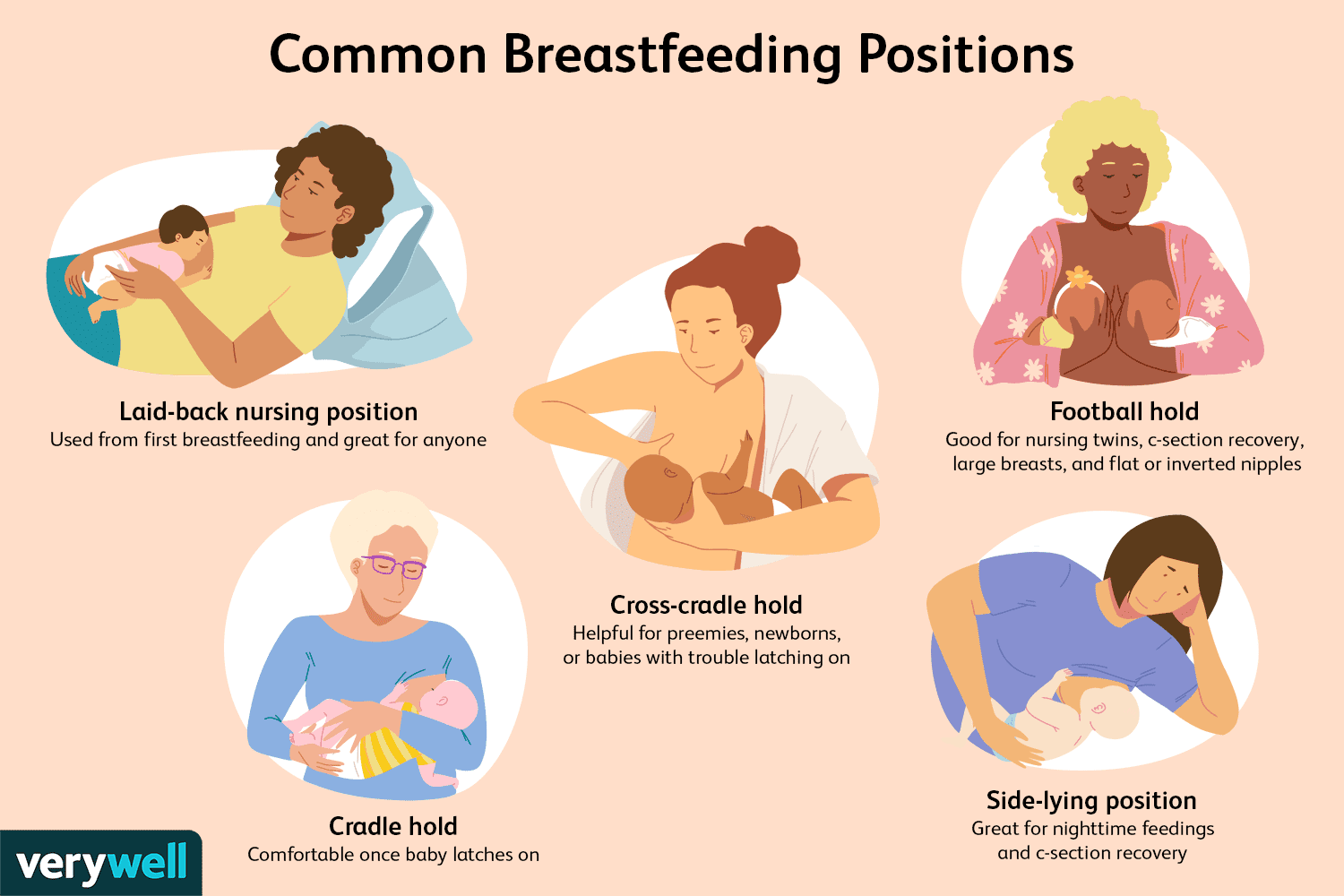As a new mom, there are many things that can interrupt your breastfeeding journey, and cause you to stop for a period of time. You may be wondering “when is it too late to start breastfeeding?”.

Medically reviewed by Macy Tollefson – doula, breastfeeding specialist & prenatal yoga teacher
Maybe you started out bottle-feeding your little one or took a break from breastfeeding for personal reasons, but now you’re eager to give breastfeeding another go. You may be feeling anxious and worried if it’s too late or if you’ll encounter any difficulties.
But fret not, mama! With the right support and approach, late breastfeeding and relactation IS possible, and it can bring a host of benefits for both you and your precious baby.
Let’s explore how you can overcome any potential challenges and start breastfeeding again with confidence.
This article is not a substitute for medical advice or consultation.
Can I Start Breastfeeding If I Never Started?
There is no specific deadline for beginning breastfeeding, and many mothers have successfully breastfed their babies after a delayed start. However, the longer you wait to begin breastfeeding, the more challenging it may become.
This answer depends on a variety of factors, like if you been pregnant or delivered your baby recently, how long it has been since your milk “dried” up, and how old your baby is…Just to name a few.
Relactation IS possible, but an ample milk supply is never guaranteed.

How Late Can I Begin Breastfeeding?
It is best to start breastfeeding as soon after birth as possible to stimulate milk production- but sometimes that is not possible. Maybe you and your newborn baby were separated for a period of time, or they got started on formula right away.
Whatever the reason, once you stop breastfeeding, it can take a variable amount of time for your breastmilk to dry up completely. Again, this depends on several factors, such as how long you have been breastfeeding, how frequently you were nursing, and how quickly your body adjusts to the hormonal changes.
Typically, it can take anywhere from a few days to a few weeks for your breastmilk to dry up completely after you stop breastfeeding1. If you are within this window of time, it is MUCH easier to reestablish your partial milk supply- although it will take work.
It’s important to note that even after your breast milk has dried up, you may still be able to express small amounts of milk for several months. This is normal!
Is It Ever Too Late To Start Breastfeeding?
While many women can successfully nurse again after having stopped, there are situations where it may be more challenging or require additional support.
For example, if you have had breast augmentation or another surgery that has affected your breast tissue, it may not be possible to produce enough milk for your baby. Additionally, some medical conditions or medications can make breastfeeding difficult or unsafe.
However, if your breast tissue is intact, medical science has evolved to the point where we are able to induce lactation in many women who have never breastfed before! Usually this requires prescription medications that mimic the hormones in a pregnant body to produce breast milk2.
Induced lactation is a very popular option amongst mothers who have adopted their baby, and were not pregnant or producing milk3! Breastmilk of any kind helps meets their baby’s nutritional needs and give them more antibodies than a formula fed baby.
Keep in mind that while it is possible to relactate, maintaining your milk supply is reliant on regular breast stimulation and expression- not supplements or medication.

When Is It Too Late To Establish Breast Milk Supply?
It is possible to establish breastmilk supply at any point after your baby’s birth, but the longer you wait, the more challenging it may become. There is also no guarantee that you will be able to produce enough milk to meet your baby’s needs.
It’s important to start as soon as possible to establish your milk supply. You can work with a lactation consultant to develop a plan that includes frequent breastfeeding or pumping, proper latch and positioning techniques, and other strategies to increase milk production.
Can I Latch An Older Baby Who Has Never Breastfed?
Yes, it is possible for a older babies who have never breastfed before to learn how to latch and breastfeed. While it may be more challenging than teaching a newborn baby to breastfeed, it is still possible with patience, persistence, and support.
There are different techniques you can learn like encouraging your baby to suckle by tickling their lips with the nipple or gently stroking their cheek. You can also assist them physically, buy supporting their chin and neck to help them maintain a good latch.

Tips For Starting Breastfeeding After Bottle-Feeding
It may take some time, but your baby CAN learn to latch effectively, even if they’ve only been bottle-fed.
Helping babies transition from bottle feeding to breastfeeding can be challenging, but here are some tips that can help:
-
Start With Skin-To-Skin Contact
Place your baby on your bare chest with just a diaper on, and allow your baby to explore and find your breast. Skin to skin can help your baby feel calm and secure, and encourage them to latch.
-
Offer Your Breast Frequently
Breastfeed your baby as often as possible, ideally every 2-3 hours4. The more you breastfeed, the more milk your body will produce. Switching breasts and offering “comfort” feeds will also help with this.
-
Use Breast Compression
While nursing, use your hand to compress the breast gently to help your baby get more milk and encourage them to continue nursing.
-
Use A Nipple Shield
Nipple shields can help your baby get used to the sensation of breastfeeding and may make it easier for them to latch. Talk to a lactation consultant or healthcare provider about whether a nipple shield may be appropriate for your situation.
-
Avoid Pacifiers
Avoid using pacifiers or other artificial nipples, as this can make it more difficult for your baby to learn to breastfeed. Nipple confusion is common in bottle or formula fed babies, who are not used to the breast.
-
Try Milk Boosters
Consider using “milk boosters” such as herbal supplements (like fenugreek or blessed thistle), lactation teas, or even medical prescriptions (such as Domperidone). Here are some lactation teas that are safe and can help improve breast milk production!
-
Seek Support
Work with a lactation consultant or healthcare provider who can provide guidance and support during the transition to breastfeeding. They can help you with latch and positioning techniques and offer advice on how to increase milk supply.
Remember that each baby is unique, and what works for one may not work for another. Seeking support and guidance can be very helpful in navigating this transition.
Looking for more tips how to make the breastfeeding journey easier? Here are my awesome breastfeeding hacks for new mom >>

Can I Start Breastfeeding Again If I Stopped?
Yes! It is possible to be able to breastfeed again, even after you’ve stopped.
Relactation is the process of a mother re-establishing her milk supply, after having stopped breastfeeding for an extended period of time5. In order for the highest chance of relactation success, you should start as soon as possible.
The relactation process may feel overwhelming at times. It requires a lot of time, patience and support to increase your milk supply after it was dwindled.
Remember, it’s important to talk to a lactation consultant or healthcare provider as soon as possible to develop a plan for getting started.
Reasons You Might Want To Start Breastfeeding Again
There are many reasons why a mother may choose to start breastfeeding again.
An example could be a mother deciding to start breastfeeding after initially choosing not to, or a mother who has experienced breastfeeding difficulties and had stopped breastfeeding, but wishes to resume.
There are also several medical procedures and medications that may require a woman to stop breastfeeding temporarily or permanently.
Some common examples are anesthesia, chemotherapy, and popular drugs used to treat different mental illness.

How Does Relactation Work?
The process of relactation involves a combination of frequent breastfeeding or pumping, proper latch and positioning techniques, and other strategies to increase milk production.
Even if it’s not your goal to exclusively breastfeed, reintroducing breastfeeding can bring a number of other benefits- like comfort and health benefits6!
Relactation does involve hormonal changes in the mother’s body, similar to those that occur during pregnancy and breastfeeding. When a baby is born, the hormone prolactin is released, which signals the body to start producing milk.
When a mother stops breastfeeding or expressing milk, prolactin levels decrease, and milk production eventually stops.
To restart milk production, the mother needs to stimulate her breasts to produce milk by either breastfeeding or pumping regularly.
| PRO TIP: To make breastfeeding and pumping easier and more comfortable I recommend you using a 2in1 nursing & pumping bra. Your should choose one that has clip down cups – for quick nursing access, as well as special cutouts for breast pump shields. Such a bra should hold your pump and make your pumping session hands-free. If you’re using Spectra – check out the best Spectra pumping bras. If you’re using hands-free pump check out my favourite bras for Willow & Elvie. |
How Long Does It Take To Relactate?
It can take several weeks (or longer) of consistent work to establish a full milk supply again.
It’s important to note that relactation may not always be successful, and each situation is unique. A lactation consultant or healthcare provider can be very helpful in navigating the process of relactation. They will be able to give you a more accurate answer around your unique situation.
Tips For Successful Relactation
- Consult with a lactation consultant or healthcare provider who can assess your situation and provide guidance on relactation techniques.
- Begin breastfeeding or pumping as frequently as possible, ideally every 2-3 hours during the day and night. The more milk that is removed from the breast, the more milk your body will produce.
- Focus on improving latch and positioning to ensure that your baby is effectively removing milk from the breast. Continue your skin to skin time, and try laidback or side lying breastfeeding positions!
- Use breast compressions while nursing or pumping to help increase milk flow and milk removal.
- Consider using a supplemental nursing system (SNS)7 to provide additional milk while breastfeeding to help increase milk production. This will also help with breast stimulation.
- Stay well hydrated and well-nourished, as this can help support milk production.
- Be patient and persistent, as it may take several weeks to establish a full milk supply!
More Questions About Nursing, Relactation & Milk Production
Read on for some frequently asked questions about nursing, relactation and milk production!
How Long Before It’s Too Late To Breastfeed?
This answer will be unique for everyone. Every breastfeeding mom’s body is different, and so they’re milk is going to dry up at different rates.
Is 2 Weeks Too Late To Start Breastfeeding?
No! Your milk supply may have dwindled, but it is very likely that you would be able to build it back up 2 weeks after birth. It will just require patience, persistence, and support.
Can I Start Breastfeeding After 4 Months?
After 4 months, it is likely that you would need professional intervention to induce lactation again, as your body and hormones would have significantly changed in that period of time. I would reccomend working with a lactation expert if you would like to relactate after 4 months.
Can I Start Breastfeeding My Toddler?
One factor to consider is that breastfed babies self-wean themselves anywhere between 6 months to 2 years. Depending on how old your child is, they simply may no longer be interested in breastfeeding- especially if they haven’t done it before.
Can I Breastfeed After 2 Months Of Not Breastfeeding?
The longer the period of time since breastfeeding stopped, the more difficult it may be to resume breastfeeding, as milk production may have significantly decreased or ceased altogether.
I would recommend working with a lactation specialist to devise a plan of approach for relactation, if it has been more than a few weeks since stopping.
What Is The Composition Of Milk During Relactation?
The composition of milk during relactation is similar to that of milk produced during the initial establishment of breastfeeding. Breast milk is composed of various components that provide the baby with essential nutrients and immune factors.
Is It Dangerous For My Baby To Breastfeed For Too Long?
No, it is not dangerous for your baby to breastfeed too long. In fact, the World Health Organization recommends exclusive breastfeeding for the first six months of a baby’s life and continued breastfeeding (with complementary foods) for up to two years and beyond8!
Article By Macy Tollefson
Macy Tollefson is a full spectrum doula, breastfeeding specialist and prenatal yoga teacher. She is passionate about guiding the modern mama on her journey through the beautiful (and wild) transformation of pregnancy, birth and postpartum. Macy envisions a world where every mother has access to the resources she needs, and follows her intuition to make the best decisions about what is right for her and her baby.
The purpose of this article is informative. It’s not a substitute for professional medical advice or medical care. Remember: safety first! Consult your doctor/pediatrician in case of any doubts. The author of this article does not accept any responsibility for any liability, loss or risk, personal or otherwise, incurred as a consequence, directly or indirectly, from any information or advice contained here.
References:
https://www.babycenter.com/
https://my.clevelandclinic.org/
https://www.laleche.org.uk/
https://llli.org/
https://www.cdc.gov/
https://www.healthychildren.org/
https://www.who.int/
https://www.whattoexpect.com/
https://www.verywellfamily.com/

